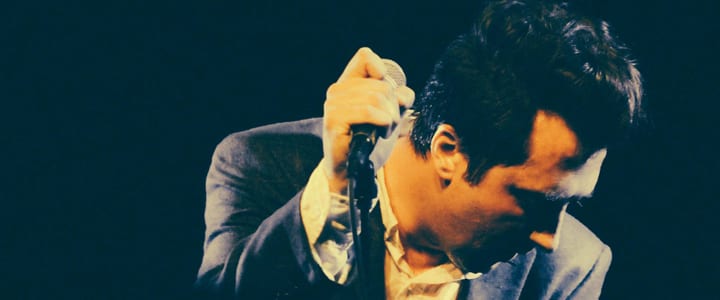 Growing up on indie rock, The Walkmen were among my favorite bands in high school and college. Though they are now on “extreme hiatus”, members of the band continue to make great music that I can love as an adult too.
Growing up on indie rock, The Walkmen were among my favorite bands in high school and college. Though they are now on “extreme hiatus”, members of the band continue to make great music that I can love as an adult too.
The band’s bassist Peter Matthew Bauer embarked on a solo career with his 2014 album Liberation!, an album that pairs spiritual themes and literary references with catchy rock hooks and psychedelic vibes.
I got the chance to talk with Bauer about his musical background, his solo career, and his favorite Latin American authors.
TL: How did you get into playing music?
PMB: I started taking guitar lessons when I was a kid from a guy in Washington DC who was sort of the local guitar teacher of choice. I did that for a couple years. I had a friend who was an older kid who had a band, so I wanted to be like them.
And now you’re a guy who a lot of people would want to be like, with your time in The Walkmen and your incredible solo record. What’s it been like for you getting out on your own and writing songs?
It’s a lot of fun. It’s great! It’s a little lonely I guess. It’s a lot more on you when it’s your own name and you’re doing everything. That makes it fun.
One of the things I really love about your record is how you incorporate some Eastern sounds in your music, a little reminiscent of George Harrison and the Beatles but there’s also something really modern and cool about how you’ve done it. Did you have a kind of guiding philosophy around how you used those elements?
I was writing these songs about how I grew up, so I thought if I could figure out ways to use slightly Indian sounding things in a couple spots, without it sounding kinda hacky, it would be fun, sort of funny. I had a harmonium laying around the house and I liked the sound of it, and that was the idea. There’s not that much of it that was meant to be Indian, it’s just sort of stuff I had.
Yeah, it’s a really light touch with that instrumentation but it’s really cool. One of my favorite songs on the record is “Latin American Ficciones”. Is that a reference to any specific author?
Yeah, it’s a reference to Jorge Luis Borges, and Roberto Bolaño also. I think I just changed it to “Ficciones” because I had a bad mix of it when it was called “Latin American Fiction”. [Laughs]. It’s a dumb joke.
It’s sort of a song from when I was figuring out how to sing and what I was going to sing about, and I think both of those writers have meant a lot to me in terms of how strong their voices are.
As much as people think of them, Borges especially, with intricate plots and being this erudite fella, really he’s bluffing his way through the whole thing and it’s just his personality. It’s himself coming through whatever he’s talking about that he thinks is interesting.
He could write a movie review and you’d know who it is. I think that’s the sign of a really great writer or artist or whatever. They can be doing anything and you can tell it’s that person.
And I think it’s also very anti-psychological too, which I think is nice. It’s not like he’s whining or self-referential, which I think is a happy way to be.
In songwriting, a lot of people think it’s about trying to exorcise these psychological problems or something like that, and I don’t think that’s the case. Even maybe people who think that’s what they’re doing aren’t necessarily doing that, because that isn’t really what’s universal.
So it sounds like for you songwriting is more about the experience and finding a way to transmit something universal. A lot of the songs also reference spirituality, from Hinduism to Scientology. Where does that theme come from for you?
I guess it’s just how I grew up and what I think about. It’s not that popular of a theme in rock music, which is weird because it’s a pretty big chunk of life, to reckon with that sort of thing seriously, or not seriously, or somehow.
It’s what I think about and talk about and read about, so I thought I’d write songs about it. It seemed more where I’m coming from than writing songs about anything else.
What was it like for you growing up?
My father and mother were both very heavy into meditation and spirituality, so I was kind of dragged around as a kid to different ashrams and things like that. So I thought if you’re gonna write a solo record with your name on it, and it’s your first one, it should be about where you’re coming from, that seems to be what people do.
That’s where I was coming from, so I figured I would find my own take on that and figure out what all that meant to me.
Do you feel now after writing those songs like you have a better grasp on what all that experience meant?
Yeah, a little bit. I think it helps to kind of process something in a song, to process the experience in a way that you wouldn’t otherwise.
It’s much less of a psychological thing and more just the experiences coming across in music, which I think is something that the musical form can do that maybe other forms can’t do as well.
So I see you’ve done entire tours of living room shows, playing in people’s homes. How have you enjoyed that as compared to the club circuit, and how did the living room tours come about?
Well, it came about because it’s a smart way of doing things when you’re by yourself. It’s either that or you hire five of your friends and drag them around and lose a lot of money.
Or you can kind of go out on your own and meet people and have these shows. You come to realize if you’re going to be playing for 50, 100, 200 people, you really don’t need a drumset to get your point across. It kind of ends up being a little off-putting to be playing with a huge band in a small room. It can be fun on certain nights but if you’re just trying to get yourself over to people it’s not that great.
I actually prefer it a lot now that I’ve done it, to the alternative. It’s a small group of people and you meet everybody, and I think they have a better experience than if they went to a rock club which can be very standoffish.
Yeah, there’s a kind of intimacy in a house show that you don’t get at another venue.
Yes, it’s a different thing. I think it’s something people will start doing more of. There’s starting to be a little network of it across the country, which is great.
It feels fresher, you’re not going to the same place that 500 other people just went through. You get to blaze your own trail. It takes a little more for everyone to be there, so everyone involved has more intention than just a Friday at the local indie rock place. I like it a lot better.
So you have a performance coming up at KAABOO and some other tour dates as well. What’s next for you?
I just moved to Los Angeles so I’m trying to figure out what the hell to do with my life. [Laughs]. Yeah, so I’ve got to figure that out and from there I’ll see what happens next.
I’m going to put a more LA based band together, or something like that I think, just to start playing with locally and work with some folks out here. And just trying to enjoy California. It seems pretty damn great.
Keep up with Peter on Facebook and Twitter, and don’t miss him when he performs in your town!
Megan L.

